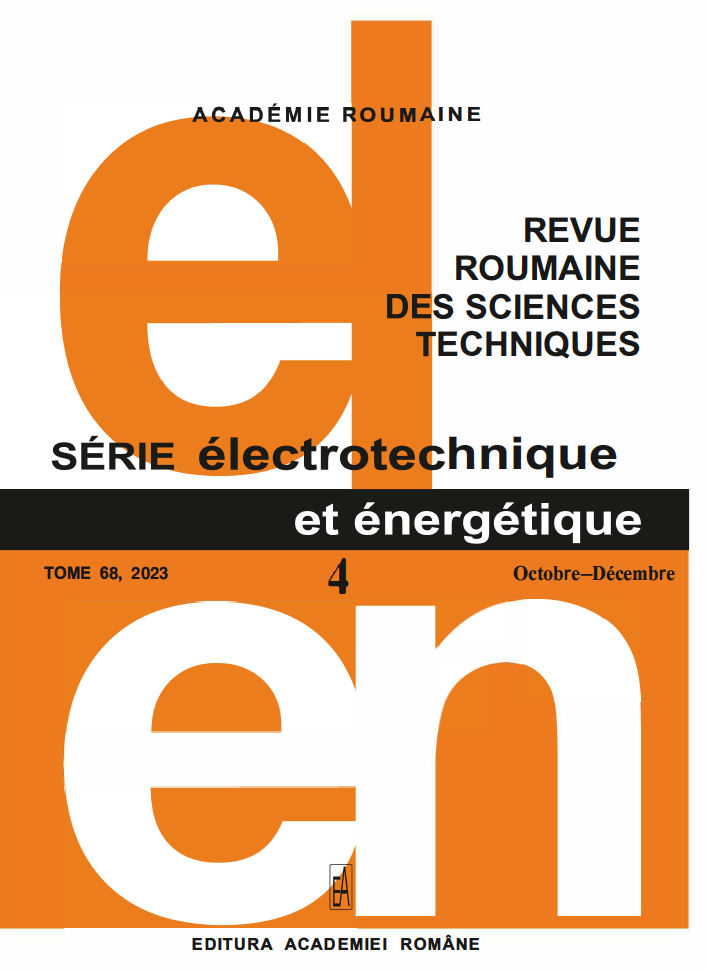SYSTÈME INTELLIGENT POUR LA RÉDUCTION DE LA CONSOMMATION ÉLECTRIQUE EN VEILLE DES ÉQUIPEMENTS MÉNAGERS
DOI :
https://doi.org/10.59277/RRST-EE.2023.4.15Mots-clés :
Équipement ménager, Consommation d'énergie en veille, Système Arduino, Android, BluetoothRésumé
L’une des caractéristiques des équipements électroménagers est qu’ils consomment également de l’énergie en mode veille, ce qui peut prendre des quantités considérables dans le temps. Un système intelligent capable de couper automatiquement l'alimentation électrique de l'équipement en mode veille doit être important pour réduire la consommation électrique et les dépenses financières. Pour concevoir le système, la consommation électrique en mode veille de 3 équipements ménagers de base a été mesurée dans un premier temps. En un mois, la consommation totale d'énergie mesurée en mode veille était de 28,31 kWh. Ensuite, les fonctions du système, basées sur le microcontrôleur Arduino Nano, ont pour rôle de contrôler l'état d'un module relais, qui est donné par le courant consommé par l'équipement. Le contrôle du système s'effectue à l'aide d'une application développée pour les appareils du système d'exploitation Android, qui peut être utilisée pour définir la valeur du courant de temporisation et activer/désactiver manuellement le système. En mettant en œuvre le système proposé sur les 3 équipements domestiques mesurés précédemment, la consommation d'énergie en mode veille est réduite de 19,83 kWh par mois.
Références
(1) A. Vasiliu, O. Nedelcu, O. Magdun, I. C. Salisteanu, A study on the energy consumption of the electrical and electronic household and office equipment in standby and off-mode, The Scientific Bulletin of Electrical Engineering Faculty, 1, pp.26-30 (2021).
(2) S. M. Daragmeh, A.T. Karslen, I.A. Hameed, Heuristic Techniques for Reducing Energy Consumption of Household, ECMS (2022).
(3) S. Matsumoto, K. Mizobuchi, S. Managi, Household energy consumption, Environ. Econ. Policy Stud., 24, 1, pp. 1–5 (2022).
(4) R.J. Desiderio, P. Del Rio, Analysing the drivers of the efficiency of households in electricity consumption, Energy Policy, 164 (2022).
(5) Eurostat, Energy Consumption in Households (2020).
(6) H. Andrei, O. Marin, M. R. Ghita, T. Ivanovici, G. Nicolaescu, P.C. Andrei, Measurement data analysis of power quality and energy efficiency for residential loads sector, IEEE-International Conference on Power and Energy Systems (ICECPS), Hong-Kong, China (12-13 April 2012).
(7) K. Nikum, R. Saxena, A. Wagh, Power quality analysis of energy efficient residential load, IEEE International WIE Conference on Electrical and Computer Engineering (WIECON-ECE) (14 August, 2017).
(8) M. Maricaru, I.V. Nemoianu, R. Creţu, New solution of linear dc actuator with additional permanent magnets: working principle, design and testing, Rev. Roum. Sci. Techn. – Électrotechn. et Énerg., 59, 1, pp. 57–66 (2014).
(9) I. Şerban, C. Marinescu, Power quality issues in a stand-alone microgrid based on renewable energy, Rev. Roum. Sci. Techn. –Électrotechn. et Énerg., 53, 3, pp. 285–293 (2008).
(10) D. Villanueva, D. San-Facundo, E. Miguez-Garcia, A. Fernandez-Otero, Modeling and simulation of household appliances power consumption, Appl. Sci., 12, 7, p. 3689 (2022).
(11) P. Hubert, M. Gerber, A. Rumsch, A. Paice, Prediction of domestic appliances usage based on electrical consumption, Energy Informatics, 1, 16 (2018).
(12) D. Moldovan, A. Slowik, Energy consumption prediction of appliances using machine learning and multi-objective binary grey wolf optimization for feature selection, Applied Soft Computing, 111 (November 2021).
(13) R.K. Chauhan, K. Chaucan, A. Badar, Optimization of electrical energy waste in house using smart appliances management system – a case study, Journal of Building Engineering, 46, 2 (2021).
(14) T. Molla, B. Khan, B. Moges, H. Alhelou, R. Zamani, P. Siano, Integrated energy optimization of smart home appliances with cost-effective energy management system, CSEE Journal of Power and Energy Systems, 5, 2 (2019).
(15) M. Eirianki, I. Varlamis, J. Dahihande, A. Jaiswal, A.A. Pagar, A.T. Thakare, Real-time recommendations for energy-efficient appliance usage in households, Front Big Data (2022).
(16) Y.A. Himeur, F. Bensaali, A. Amira, C. Sardianos, I. Varlamis, G. Dimitrakopoulos, Achieving domestic energy efficiency using micro-moments and intelligent recommendations, IEEE Access, 8 (2020).
(17) J. Codispoti, A. R. Khamesi, N. Penn, S. Silvestri, E. Shin, Learning from non-experts: an interactive and adaptive learning approach for appliance recognition in smart homes, ACM Trans. Cyber Phys. Syst. 6, pp. 1–22 (2022).
(18) S. Mursid, H. Santaso, Analysis of the Effectiveness of the Utilization of Power Monitoring Devices in Reducing Electric Energy Consumption, Journal of Physics Conference, Series 1364 (2019).
(19) K.A. Rahman, A.M. Leman, F.M. Mubin, M.Z.M. Yusof, A. Harir, M.N.M. Salleh, Energy consumption analysis based on energy efficiency approach: a case of suburban area, MATEC Web Conf., 87 (2017).
(20) J.L. Reyna, M.V. Chester, Energy efficiency to reduce residential electricity and natural gas use under climate change, Nature Communications 8, 14916 (2017).
(21) F. Issi, O. Kaplan, The determination of load profiles and power consumptions of home appliances, Energies, 11, 3 (2018).
(22) P. Ajay-D-Vimal Raj, M. Sudhakaran, P.A. Raj, Estimation of standby power consumption for typical appliances, Journal of Engineering Science and Technology Review, 2, 1, (2009).
(23) A.C. Gheorghe, H. Andrei, E. Diaconu, Data measurement and modeling method of electrical parameters of basic household equipment, 14th International Conference on Electronics, Computers and Artificial Intelligence (ECAI) (2022).
(24) A.C. Gheorghe, I. Udroiu, E. Stan, Electricity Consumption Measurement System Using ESP32, The Scientific Bulletin of Electrical Engineering Faculty, 21, 2, pp. 23-26 (2021).
(25) ***Autodesk product description AutoCAD 3D. Available online: https://www.autodesk.com/solutions/3d-cad-software (accessed on 14 December 2022).
(26) ***Proteus getting started guide. Available online: https://labcenter.s3.amazonaws.com/downloads/Tutorials.pdf (accessed on 16 December 2022).
(27) D. Chians-Palacios, C. Vargas-Salgado, J. Aguila-Leon, E. Huardo-Perez, Arduino-based smart power meter: a low-cost approach for academic and research applications, Conference: INNODOCT (2020).
(28) H.E. Degha, F.Z. Laallam, A.O. Chaima, S.S. Maroua, Implementation of an energy monitoring system based on Arduino, Conference Artificial Intelligence and Its Applications (2019).
Téléchargements
Publiée
Numéro
Rubrique
Licence
(c) Copyright REVUE ROUMAINE DES SCIENCES TECHNIQUES — SÉRIE ÉLECTROTECHNIQUE ET ÉNERGÉTIQUE 2023

Ce travail est disponible sous licence Creative Commons Attribution - Pas d'Utilisation Commerciale - Pas de Modification 4.0 International.


